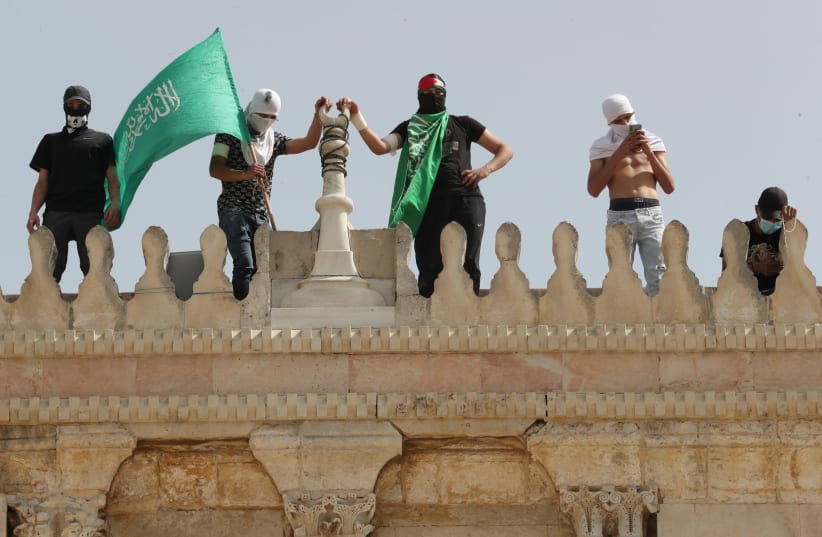It could have gone either way. Calm could have returned, or Israel could have found itself at war.
Though the past week has seen hundreds of Palestinians and Israeli police officers and civilians injured, the defense establishment still thought that the situation could have returned to normal.
But that was wishful thinking.
More than 300 Palestinians and several Israelis were injured in clashes with police officers on Monday in violence that the city has not seen in years. While Israel has been condemned for how it is dealing with the crisis in Jerusalem, the situation could have been much worse.
As of this article’s writing, while blood has been spilled at the Temple Mount and grenades have been thrown inside al-Aqsa Mosque, no one had lost their life.
Nevertheless, on Monday evening, Hamas and Palestinian Islamic Jihad decided they could no longer be quiet. They fired more than 50 rockets toward Israel, including seven at Jerusalem.
According to Palestinian reports, Israel struck back quickly, including a strike on Beit Hanun in northern Gaza that killed three children, although others said it was a failed launch from Gaza.
Palestinian terrorists have recently tried to carry out other attacks, such as at the Salem Border Police base on Friday, but none have been successful.
Hamas and Palestinian Islamic Jihad (PIJ) have threatened Israel, but before Monday evening, fewer than 10 rockets had been fired over the past week from the blockaded coastal enclave.
Hamas instead resorted to launching hundreds of incendiary balloons that have wreaked havoc on fields and nature reserves. It’s a strategy that shows the terrorist group supports Palestinians in Jerusalem but does not want to risk serious retaliation from Israel.
The IDF has increased its troop deployment to the West Bank, where it has been expecting more violence.
The military believed that even with the threats by Hamas and PIJ, the Islamists are more deterred than previously thought.
But they aren’t.
Although Israel and terrorist groups in the Gaza Strip have clashed several times over the last three years, the past year has seen far less violence, due in part to the coronavirus pandemic.
But with the country seemingly over the worst of the deadly pandemic, things are back to their old ways. And the political deadlock that Israel is facing, compounded by the cancellation of Palestinian elections, has not made the situation any easier.
Two and a half weeks ago, when some 36 rockets were fired toward Israel, IDF Chief of Staff Lt.-Gen. Aviv Kohavi ordered an extensive aerial operation to be prepared. The planes were armed and the pilots were ready, but then they were ordered to stand down.
On Monday, the IDF postponed the largest drill in its 73-year history. Thousands were set to take part in the exercise, dubbed “Chariots of Fire,” which would have seen all commands, as well as political bodies, simulate a multifront war against Israel’s enemies.
Kohavi had earlier decided that the drill would go ahead despite the growing security crisis in Jerusalem and subsequent tensions on the northern and southern borders. However, due to the current violence, one battalion that was expected to take part was redeployed to the West Bank.
Instead of starting a “war month,” the IDF could have been at war, a senior officer said.
And on Monday evening, all indications pointed to just that.
Rockets likely will pound Israel, and a Hamas or PIJ cell in the West Bank or from Gaza could attack the IDF or Israeli civilians.
Jerusalem is a tinderbox on slow burn. And because of that, the country looks like it will be dragged into another round of violence with terrorist groups.
